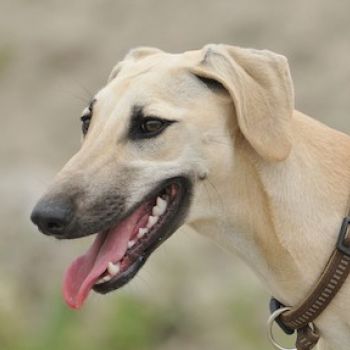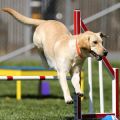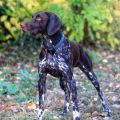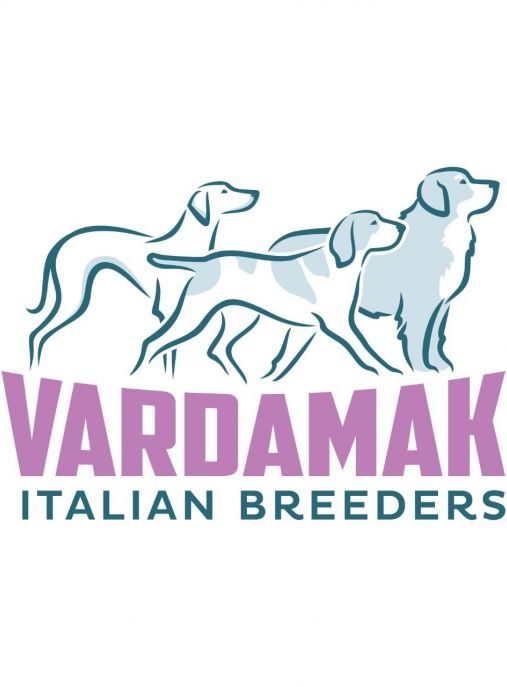The Sloughi, also known as the Arabian Greyhound, is an ancient and noble breed of dog that originated in North Africa. With its elegant and athletic build, the Sloughi is often referred to as the "Sighthound of the Desert." This breed is highly regarded for its speed, agility, and endurance, making it an exceptional hunting companion and a beloved family pet.
The history of the Sloughi can be traced back thousands of years, with evidence of its existence found in ancient Egyptian tombs and artwork. It is believed that the breed was developed by the nomadic Berber tribes of the Sahara Desert, who selectively bred dogs for their hunting prowess and ability to withstand the harsh desert conditions.
According to the FCI (Fédération Cynologique Internationale) typology, the Sloughi belongs to Group 10, which includes Sighthounds. These dogs are known for their exceptional sight and speed, making them excellent hunters. Within this group, the Sloughi falls under Section 3, which comprises the "Short-haired Sighthounds."
The Sloughi is primarily a hunting dog, specializing in chasing down and capturing game such as gazelles, hares, and foxes. Its incredible speed and agility allow it to cover vast distances effortlessly, making it an invaluable asset to hunters in the desert. However, the Sloughi's gentle and affectionate nature also makes it a wonderful companion for families, as it forms strong bonds with its owners and is known to be loyal and protective.
In terms of physical characteristics, the Sloughi is a medium-sized dog with a lean and muscular body. Males typically stand between 24 to 29 inches (61 to 74 cm) at the shoulder, while females are slightly smaller, ranging from 23 to 27 inches (58 to 69 cm). The weight of a Sloughi generally falls between 35 to 60 pounds (16 to 27 kg), with males being slightly heavier than females.
One of the most distinctive features of the Sloughi is its sleek and smooth coat, which comes in a variety of colors including sand, red, brindle, and black. The coat is short and dense, providing protection against the desert elements. The Sloughi's almond-shaped eyes are dark and expressive, reflecting its gentle and intelligent nature.
The average life expectancy of a Sloughi is around 12 to 15 years, which is relatively long for a large breed. This breed is generally healthy and robust, with few hereditary health issues. However, like all dogs, regular veterinary check-ups, a balanced diet, and sufficient exercise are essential to ensure their overall well-being.
Despite its ancient lineage and unique qualities, the Sloughi remains a relatively rare breed outside of its native regions. However, efforts are being made to increase its popularity and preserve its genetic diversity. The Sloughi is recognized by various kennel clubs worldwide, including the FCI, the American Kennel Club (AKC), and the United Kennel Club (UKC).
In addition to its hunting abilities, the Sloughi possesses a calm and gentle temperament, making it an excellent choice for families with older children. While they may be reserved with strangers, Sloughis are known to be loyal and devoted to their families. They thrive on human companionship and require regular exercise to keep them physically and mentally stimulated.
In conclusion, the Sloughi is a remarkable breed with a rich history and exceptional qualities. Its elegant appearance, coupled with its speed and endurance, make it a highly prized hunting dog. However, its gentle and affectionate nature also makes it a cherished family companion. With proper care and attention, the Sloughi can bring joy, loyalty, and a touch of elegance to any household lucky enough to have one.
The Sloughi, also known as the Arabian Greyhound, is a magnificent breed of dog that possesses a unique and captivating character. With their elegant appearance and gentle demeanor, Sloughis are often regarded as one of the most loyal and affectionate companions one can have. In this text, we will delve into the character of Sloughi dogs, their behavior, and how to raise and train them.
Sloughis are known for their calm and reserved nature. They are typically independent and somewhat aloof, especially with strangers. However, once they form a bond with their family, they become incredibly devoted and protective. This breed is highly sensitive and intuitive, often able to sense their owner's emotions and respond accordingly. Sloughis are not known to be aggressive, but they will not hesitate to defend their loved ones if they sense any threat.
When it comes to behavior, Sloughis are generally quiet and not prone to excessive barking. They are intelligent dogs that possess a strong prey drive, owing to their history as hunting dogs in the deserts of North Africa. This instinct can make them prone to chasing small animals, so it is important to keep them on a leash or in a securely fenced area when outside. Sloughis are also known for their incredible speed and agility, making them excellent runners.
Raising a Sloughi requires a patient and understanding approach. Early socialization is crucial to ensure they grow up to be well-rounded dogs. Exposing them to various people, animals, and environments from a young age will help them develop confidence and prevent any potential shyness or fearfulness. Sloughis thrive in a calm and stable environment, so it is important to provide them with a consistent routine and avoid any harsh training methods.
Training a Sloughi can be a rewarding experience, but it requires a gentle and positive approach. This breed is intelligent and eager to please, but they can also be sensitive to harsh corrections. Using positive reinforcement techniques such as treats, praise, and play will yield the best results. Sloughis excel in activities that engage their natural instincts, such as lure coursing or agility training. Mental stimulation is equally important, as they are intelligent dogs that need regular mental challenges to prevent boredom.
Exercise is essential for Sloughis, as they have a high energy level. They require daily walks or runs to keep them physically and mentally stimulated. However, it is important to note that Sloughis are not suitable for off-leash activities in unsecured areas due to their strong prey drive. A securely fenced yard or a safe, enclosed space is ideal for them to stretch their legs and run freely.
In conclusion, the Sloughi is a breed of dog with a unique character that combines loyalty, independence, and sensitivity. They make wonderful companions for individuals or families who can provide them with the love, attention, and exercise they require. With proper socialization, training, and care, a Sloughi can become a cherished member of the family, bringing joy and companionship for many years to come.
The Sloughi, also known as the Arabian Greyhound, is a graceful and elegant breed that requires specific care to ensure their well-being. Here are some tips on how to care for Sloughi dogs, including what to do and what not to do:
1. Exercise: Sloughis are active dogs that require regular exercise to stay healthy and happy. They have a strong prey drive, so it's crucial to provide them with a securely fenced area where they can run and play freely. Daily walks or jogs are also essential to keep them mentally and physically stimulated.
2. Mental Stimulation: In addition to physical exercise, Sloughis need mental stimulation to prevent boredom. Engage them in interactive games, obedience training, or even agility courses. Puzzle toys and treat-dispensing toys can also keep their minds occupied.
3. Grooming: Sloughis have a short, smooth coat that requires minimal grooming. Regular brushing with a soft bristle brush will help remove loose hair and keep their coat shiny. Bathing should be done only when necessary, as excessive bathing can strip their coat of natural oils. Additionally, regular dental care, nail trimming, and ear cleaning are essential parts of their grooming routine.
4. Socialization: Sloughis are naturally reserved and can be aloof with strangers. Early and ongoing socialization is crucial to ensure they are well-adjusted and friendly towards people and other animals. Expose them to various environments, sounds, and experiences from a young age to help them develop into confident and well-behaved dogs.
5. Diet: Provide a high-quality, balanced diet that meets the nutritional needs of Sloughis. Consult with your veterinarian to determine the appropriate portion sizes and feeding frequency based on their age, weight, and activity level. Avoid overfeeding, as Sloughis can be prone to weight gain, which can lead to health issues.
6. Health Care: Regular veterinary check-ups are essential to monitor the overall health of your Sloughi. Vaccinations, parasite prevention, and dental examinations should be part of their routine care. Sloughis are generally a healthy breed, but they may be prone to certain conditions like bloat, hip dysplasia, and progressive retinal atrophy. Regular exercise, a balanced diet, and maintaining a healthy weight can help minimize the risk of these issues.
What NOT to do:
1. Do not leave your Sloughi alone for extended periods. They are a sensitive breed and thrive on human companionship. Leaving them alone for too long can lead to separation anxiety and destructive behaviors.
2. Avoid harsh training methods or punishment. Sloughis respond best to positive reinforcement techniques and gentle guidance. Harsh training methods can damage their trust and hinder their progress.
3. Do not let your Sloughi off-leash in an unsecured area. Their strong prey drive can cause them to chase after small animals, potentially leading to accidents or injuries. Always ensure they are in a secure, fenced area or on a leash when outside.
4. Avoid overexercising your Sloughi during their growth phase. Excessive running or jumping on hard surfaces can put stress on their developing joints, potentially leading to long-term issues. Consult with your veterinarian to determine the appropriate exercise routine for your Sloughi's age and development stage.
In conclusion, caring for a Sloughi requires providing regular exercise, mental stimulation, proper grooming, socialization, a balanced diet, and routine veterinary care. By following these tips and avoiding common mistakes, you can ensure your Sloughi lives a healthy, happy, and fulfilling life.
The Sloughi dog breed is known for its elegant and regal appearance, and their coat color plays a significant role in enhancing their overall beauty. The most common color seen in Sloughi dogs is a stunning array of shades known as sand, which is often referred to as "sand color" or "sand coat."
The sand color of Sloughi dogs is a unique blend of various shades of beige, fawn, and light brown, resembling the color of desert sand. It is a warm and earthy tone that exudes a sense of grace and sophistication. The sand coat is often described as having a rich and velvety texture, which adds to the dog's overall allure.
Within the sand color spectrum, there can be slight variations in shades and intensity. Some Sloughis may have a lighter sand color, almost resembling a pale cream or ivory, while others may have a deeper and more intense hue, leaning towards a darker tan or light brown. These variations give each Sloughi a distinct and individual appearance.
The sand coat of Sloughi dogs is often accompanied by a darker mask on their face, which can range from a deep brown to a black color. This mask accentuates their expressive eyes and adds a touch of mystery to their overall look. The ears and tail of Sloughis are usually darker than the rest of their body, creating a beautiful contrast against the sand-colored coat.
One of the remarkable features of the sand coat is its ability to reflect light, giving it a subtle shimmering effect. This adds depth and dimension to the dog's appearance, making them truly captivating to behold. The sand color also blends seamlessly with their surroundings, making them well-suited for their original purpose as desert hunting dogs.
The sand coat of Sloughi dogs is not only visually appealing but also serves a practical purpose. It provides excellent camouflage in their natural habitat, allowing them to blend in with the sandy dunes and rocky terrains of the desert. This coloration helped them in their hunting endeavors, enabling them to approach their prey unnoticed.
In conclusion, the common color of Sloughi dogs is a breathtaking sand coat that showcases a range of beige, fawn, and light brown shades. This color, combined with their sleek and athletic build, gives them an air of elegance and grace. The sand coat's ability to reflect light and blend with their surroundings further enhances their beauty and makes them a truly remarkable breed.
The Sloughi, also known as the Arabian Greyhound, is a graceful and elegant breed of dog that originated in North Africa. Known for their incredible speed and agility, Sloughis are not only exceptional hunters but also make wonderful companions. Like all dog breeds, Sloughis are prone to certain health issues that owners should be aware of in order to provide the best care possible.
One of the most common health concerns in Sloughis is hip dysplasia. This condition occurs when the hip joint doesn't develop properly, leading to discomfort, pain, and eventually arthritis. Regular exercise and maintaining a healthy weight can help reduce the risk of hip dysplasia. Additionally, responsible breeders should perform hip evaluations on their breeding dogs to minimize the occurrence of this condition in future generations.
Another health issue that Sloughis may face is progressive retinal atrophy (PRA). PRA is a degenerative eye disease that leads to gradual vision loss and can eventually result in blindness. Regular eye examinations by a veterinary ophthalmologist can help detect PRA early on, allowing for appropriate management and care.
Sloughis are also prone to certain autoimmune disorders, such as autoimmune hemolytic anemia (AIHA) and autoimmune thyroiditis. AIHA occurs when the immune system mistakenly attacks and destroys red blood cells, leading to anemia. Autoimmune thyroiditis, on the other hand, affects the thyroid gland and can result in hormonal imbalances. Regular blood tests can help monitor thyroid function and detect any abnormalities early on.
To ensure the overall health and well-being of Sloughis, proper care and attention are essential. Here are some key aspects to consider:
1. Nutrition: Providing a balanced and high-quality diet is crucial for the overall health of Sloughis. Consult with a veterinarian to determine the appropriate diet based on the dog's age, activity level, and any specific health concerns.
2. Exercise: Sloughis are an active breed that requires regular exercise to maintain their physical and mental well-being. Daily walks, runs, or play sessions in a securely fenced area are recommended to keep them happy and healthy.
3. Regular veterinary check-ups: Routine visits to the veterinarian are essential for preventive care and early detection of any health issues. Vaccinations, parasite prevention, and dental care should be part of the regular check-up routine.
4. Grooming: Sloughis have a short, smooth coat that requires minimal grooming. Regular brushing to remove loose hair and occasional baths are usually sufficient to keep their coat in good condition.
5. Socialization and mental stimulation: Sloughis are intelligent dogs that thrive on human companionship. Proper socialization from an early age and providing mental stimulation through training, interactive toys, and puzzles can help prevent behavioral issues.
6. Responsible breeding: If considering breeding Sloughis, it is crucial to work with responsible breeders who prioritize the health and genetic testing of their breeding dogs. This helps reduce the risk of passing on hereditary diseases to future generations.
In conclusion, Sloughis are generally a healthy breed, but like any other dog breed, they can be prone to certain health issues. By providing proper care, nutrition, regular veterinary check-ups, and early detection of any health concerns, owners can ensure their Sloughis lead happy and healthy lives.
The Sloughi dog, also known as the Arabian Greyhound, is a breed that requires a well-balanced and nutritious diet to maintain optimal health and energy levels. Proper nutrition plays a vital role in their overall well-being, ensuring they have strong bones, a healthy coat, and a robust immune system. Here is an extensive description of the nutrition requirements for Sloughi dogs, along with advice on feeding and what to avoid.
Protein is an essential component of a Sloughi's diet. It aids in muscle development and repair, making it crucial for this active and athletic breed. High-quality animal-based proteins such as lean meats (chicken, turkey, beef), fish, and eggs should form the foundation of their diet. These proteins provide essential amino acids that support the dog's growth and maintenance.
Carbohydrates are another important nutrient for Sloughis, as they provide energy for their active lifestyle. Opt for complex carbohydrates like whole grains (brown rice, oats, quinoa) and vegetables (sweet potatoes, peas, carrots). These sources offer a steady release of energy and are rich in fiber, aiding in digestion and maintaining a healthy weight.
Fats are a concentrated source of energy and are necessary for the absorption of fat-soluble vitamins. Incorporate healthy fats into their diet through sources like fish oil, flaxseed oil, and olive oil. These fats also contribute to a shiny coat and healthy skin.
Vitamins and minerals are crucial for a Sloughi's overall health. A well-balanced diet should provide them with essential vitamins such as A, D, E, and B-complex vitamins. Minerals like calcium, phosphorus, and magnesium are vital for strong bones and teeth. These nutrients can be obtained through a combination of high-quality commercial dog food and fresh, whole foods.
When feeding a Sloughi, it is important to consider their activity level and age. Puppies require a higher calorie intake to support their growth, while adult dogs need a balanced diet to maintain their weight and energy levels. Dividing their daily food into two or three meals is recommended to prevent bloating and aid digestion.
While providing a nutritious diet is crucial, there are certain foods that should be avoided for Sloughis. These include:
1. Toxic foods: Sloughis should never be fed chocolate, caffeine, grapes, raisins, onions, garlic, or anything containing xylitol, as these can be toxic to dogs.
2. High-fat foods: While fats are essential, excessive amounts can lead to obesity and other health issues. Avoid feeding them fatty meats, fried foods, or excessive amounts of treats.
3. Processed foods: Highly processed foods, including those high in preservatives, artificial colors, and flavors, should be avoided. Opt for natural and minimally processed options whenever possible.
4. Bones: Sloughis have a sensitive digestive system, and feeding them cooked bones can lead to choking, intestinal blockages, or dental injuries. Stick to raw bones specifically designed for dogs if you choose to include them in their diet.
5. Allergenic foods: Some dogs may have food allergies or sensitivities. Common allergens include wheat, corn, soy, and dairy products. If you notice any signs of allergies, such as itching, gastrointestinal issues, or skin problems, consult with a veterinarian to determine the best diet for your Sloughi.
In conclusion, providing a well-balanced and nutritious diet is essential for the health and well-being of Sloughi dogs. A diet rich in high-quality proteins, complex carbohydrates, healthy fats, vitamins, and minerals will support their active lifestyle and maintain their overall health. Avoiding toxic foods, excessive fats, processed foods, cooked bones, and potential allergens will help ensure their diet is safe and beneficial. Always consult with a veterinarian for personalized advice on feeding and nutrition for your Sloughi.






